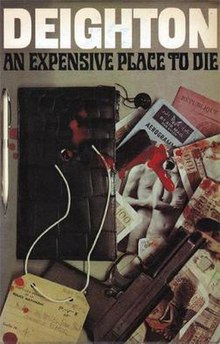 First edition (UK) | |
| Author | Len Deighton |
|---|---|
| Cover artist | Raymond Hawkey [1] |
| Language | English |
| Publisher | Jonathan Cape (UK) Putnam (US) |
Publication date | 1967 |
| Publication place | United Kingdom |
| Media type | |
| Pages | 254 |
| Preceded by | Billion-Dollar Brain |
An Expensive Place to Die is a 1967 novel by Len Deighton. It is set initially in Paris and takes its title from an Oscar Wilde quotation about the said city. ("Dying in Paris is a terribly expensive business for a foreigner.") The action concerns the shady dealing and possible expensive pimping of one Monsieur Datt against a background of espionage. This is the fifth novel in the "unnamed hero" series, but unlike the previous ones, it includes chapters and sections in the third person. [2]